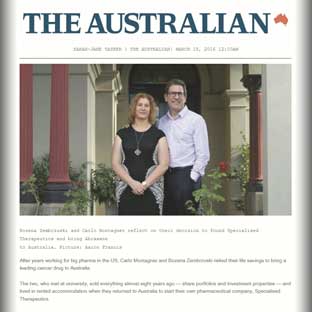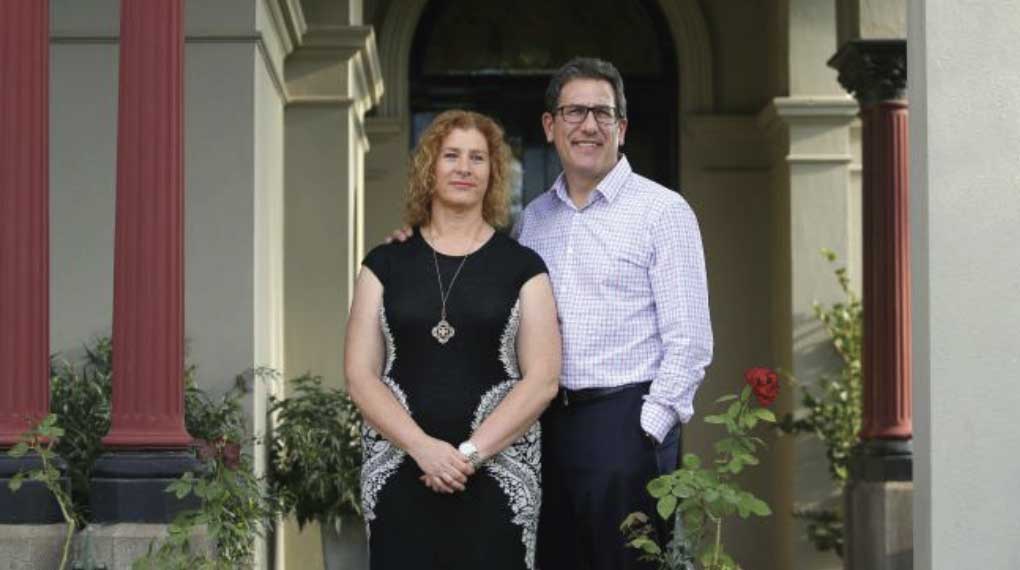Latest News

From Big Pharma to Small Starts: Risking it All on a Life-Saving Cancer Drug to Win

SARAH-JANE TASKER | THE AUSTRALIAN| MARCH 19, 2016 12:00AM
From Big Pharma to Small Starts:
Risking it All on a Life-Saving Cancer Drug to Win

Bozena Zembrzuski and Carlo Montagner reflect on their decision to found Specialised Therapeutics and bring Abraxane to Australia. Picture: Aaron Francis
After years working for big pharma in the US, Carlo Montagner and Bozena Zembrzuski risked their life savings to bring a leading cancer drug to Australia.
The two, who met at university, sold everything almost eight years ago — share portfolios and investment properties — and lived in rented accommodation when they returned to Australia to start their own pharmaceutical company, Specialised Therapeutics.
Montagner, who became chief executive, says he and his wife — parents to three children — took a risk on the Melbourne start-up. The early days of the business were a stark reminder of these risks.
The first drug they wanted to bring into Australia, Abraxane, developed to treat breast cancer, was originally rejected by the Pharmaceutical Benefits Scheme — the system under which the government subsidises the cost of medicine.
“I called my wife after I was told the PBS had rejected it and her first words were ‘we’re — ruined’,” Montagner says.
“I said we weren’t because ‘it is too good a drug not to get through, so let’s play it through’.”
The couple, like most Australians, have watched friends and family battle cancer. Montagner’s father died last September from mesothelioma and the oncology expert says that, given his role, he is often approached by friends and family for advice on the deadly disease.
“When I receive a call from a friend for advice, it’s usually not for financial advice, so I generally tense up,” he says.
“For most patients given cancer diagnosis, and I went through this myself with my father last year, it’s just mind numbing, you don’t know where to turn and there’s a lot of information out there,” Montagner says.
The privately owned company — Montagner has no interest in attracting third-party investors — generated more than $35 million in revenue last year but he says it isn’t just about money.
“I’m very passionate about this. I really do believe that this (Abraxane) is the chemotherapy that all Australian women should receive.”
Bringing a drug to the Australian market is usually reserved for those with deep pockets and time on their side. Drugs have to be licensed, which involves significant testing to secure the right local approvals. The testing needs to be done regardless of a drug’s use or approval in other jurisdictions.
Montagner tells The Weekend Australian the original financial risk they took as a family was worth it because he had a strong belief in Abraxane, which he had launched in the US in his previous role as president of the drug’s developer, Abraxis Bioscience.
Prior to the introduction of that drug into Australia in 2009, Montagner said breast cancer patients were using older chemotherapies that had been around for 20 years.
He says that today, Abraxane is one of the leading therapies for metastatic breast cancer and pancreatic cancer. Since the drug became available in Australia, more than 10,000 cancer patients have been treated with Abraxane.
The drug, which is now owned by US pharma Celgene, has been approved for distribution in about 50 countries, including the US, Europe, Japan and India.
Montagner says the early take-up of the drug in Australia had exceeded their expectations “several fold”.
“We got caught in the first 18 months never really having enough stock,” he says.
“I couldn’t believe how quickly it was being adopted. We put the manufacturing plant in Phoenix under pressure ... the plant once pulled out all stops, working 24-7 for a week to make a batch for Australia because we were selling so much of it.”
Zembrzuski says while the company was started with some trepidation, they took the view that if it didn’t work, they would simply get jobs again.
“We had a lot of faith in all the training and experience we’d built up in our previous roles in Australia and overseas,” she says.
The company co-founder, who previously worked for global drug giant Novartis, says it’s a different dynamic to have a married couple as the bosses, which she said had the potential to go terribly wrong.
“We were very aware right from the start that being married should not cause any confusion or stress to people,” she says.
“If this was going to be a credible and professional venture then that couldn’t happen.”
Zembrzuski jokes that she was worried if she could take direction from her husband given he had taken on the CEO role. She says she decided to treat him at work as she would any of her previous managers.
“We both have strong opinions, are both self-motivated and have always worked for other people, never together,” she says. “But we bring different strengths to the table and we do complement each other.”
The company was originally started because Montagner says it was difficult to get a role in Australia that matched the remuneration he was accustomed to in the US as the president of a Nasdaq-listed biotech. He and his wife are passionate about conveying that they don’t take the success of the company for granted.
“We feel very lucky that we are able to provide for the kids and are our own bosses,” Zembrzuski says.
Teaching their three children, aged 9, 12 and 14, about giving and not just taking is central to the values they want to pass on as parents.
Montagner says that before they went to the US, they were like most Australians and saw people who sprouted philanthropic endeavours as “show-offs”.
“Then we went to the US and there it’s in the DNA of all successful people. We saw that and we completely changed our view and bought into the concept that people who do well and have the opportunity to give back should give back,” he says.
“Plus, we both grew up in working class families that didn’t have the opportunities to do what we do now, so the last thing we want is our kids to grow up in a privileged household where they became too materialistic and focused on themselves than others in greater need.”
The family started its philanthropic efforts with a $1m donation to the Olivia Newton-John cancer research centre based at Melbourne’s Austin Hospital. They have also donated $US250,000 ($328,000) to build a trade school in East Timor.
Zembrzuski adds they are a “proud” Australian-owned company and while they will always maintain their head office in Melbourne, part of being entrepreneurial was looking at new options.
They expanded into Southeast Asia last year with the distribution of a drug to treat myeloma, a type of blood cancer.
“We aim to bring drugs to Australia and South East Asia that fulfil unmet medical needs,” Montagner says.
“We say no to drugs that don’t provide a unique benefit because then it becomes a pure marketing exercise if it doesn’t and we’re not interested in that.”
The company was founded on oncology drugs but it is also targeting haematology, urology and supportive care.
The rapid growth of Specialised Therapeutics has put it on the radar of larger companies but Montagner says he has no plans to sell.
“I love the fact we’re in a position where we can help others with some of the wealth we are generating and I love coming to the office each day and doing what we do. I see Rupert Murdoch and Warren Buffett ... what I take from them is they love what they do, it’s not a job, it’s what you do every day.”



